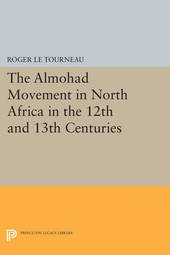
|
Almohad Movement in North Africa in the 12th and 13th Centuries
Paperback / softback
Main Details
| Title |
Almohad Movement in North Africa in the 12th and 13th Centuries
|
| Authors and Contributors |
By (author) Roger Le Tourneau
|
| Series | Princeton Legacy Library |
|---|
| Physical Properties |
| Format:Paperback / softback | | Pages:138 | | Dimensions(mm): Height 235,Width 152 |
|
| Category/Genre | African history
History of religion |
|---|
| ISBN/Barcode |
9780691621814
|
| Classifications | Dewey:961.022 |
|---|
| Audience | | Tertiary Education (US: College) | | Professional & Vocational | |
|---|
|
Publishing Details |
| Publisher |
Princeton University Press
|
| Imprint |
Princeton University Press
|
| Publication Date |
8 December 2015 |
| Publication Country |
United States
|
Description
This is an analysis of the powerful Islamic religious movement, initiated by Ibn T?mart among the Berber tribesmen of North Africa, which culminated in the creation of the huge Almohad empire in the twelfth century. Professor Le Tourneau presents his reflections on the place of the movement in history as well as on its influence in present-day Africa. His principal aim is to elucidate how the Almohads managed to unite all of North Africa and Spain in one empire, and why they ultimately failed to hold their empire together. He also shows that some of the essential factors in Almohad society are still influential in Africa today and that the Almohad experience can aid contemporary promoters of North African unity and prevent them from repeating the mistakes of the twelfth-century rulers. Originally published in 1969. The Princeton Legacy Library uses the latest print-on-demand technology to again make available previously out-of-print books from the distinguished backlist of Princeton University Press. These editions preserve the original texts of these important books while presenting them in durable paperback and hardcover editions. The goal of the Princeton Legacy Library is to vastly increase access to the rich scholarly heritage found in the thousands of books published by Princeton University Press since its founding in 1905.
|